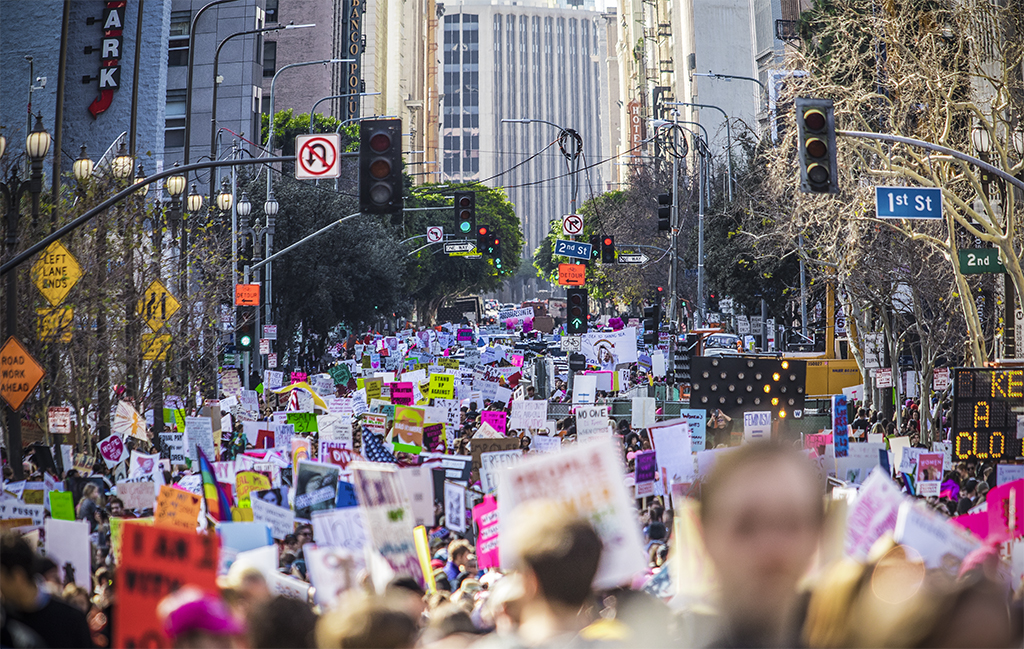The Los Angeles Women’s March on Saturday gathered, by organizers’ estimates, a whopping 750,000 people to Downtown, making it the second-largest march in the country and the largest the city’s seen in a decade.
All in all, an estimated 2.9 million — including the 1.2 million who attended the Washington march — showed up to marches in cities across the country Saturday to stand up against President Donald Trump’s rhetoric, making it the biggest protest in U.S. history.
Peaceful protesters called for women’s rights, many in support of Planned Parenthood and Obamacare, as well as progress in a diverse range of issues that included racism, climate change and immigration.
The Los Angeles Police Department said Sunday that they did not make a single arrest — a phenomenon also reflected in protests elsewhere.
Celebrities, among them Miley Cyrus, Barbra Streisand, Demi Lovato, Laverne Cox, Jane Fonda, Jackson Browne, Rufus Wainwright, Brandy, Jenifer Lewis, Kerry Washington, Jamie Lee Curtis and Natalie Portman, spoke and performed in support.
We asked those who marched from Pershing Square to City Hall one question: “Why are you here today?”

A protester’s sign at the Los Angeles Women’s March on Jan. 21, 2017 (Tae Hong/Kore Asian Media)
Erica Tovar-Hernandez, 32
“I came out [here] to represent as a woman and as a Latina, and show that what Trump has done, he’s pretty much normalizing something that shouldn’t be normalized. He has not shown anything or said anything to unify this country or unify us. I feel like it’s time that we have our revolution, that it be a peaceful revolution, and that we really stand up for what we believe in and come out as a beautiful community and come together. We’ve talked about divisiveness for so many months, and this is something that [says], ‘No, we’re not divided.’ We can come together, we can work together and break that rhetoric. That’s why I’m here.
I’m going to UC Riverside. I’m a college student. I’m a gender and sexuality major, so this is something that really hits home for me. I also work for city government. I’m pretty much trying to bring my community together within that space that I’m employed with, and where I am at school. It’s something that’s on my agenda, to do something as a woman and as an individual in this country.”

(Tae Hong/Kore Asian Media)

(Tae Hong/Kore Asian Media)
Nina Fernando, 27
“Community. I’m saying that I and other immigrants and people of color and women and LGBT community, and you name it, belong here. This is our country. Just to stand up against hate and discrimination and exclusion. To resist. I am the child of immigrants. My parents are Sri Lankan. I feel like this president is threatening all of our rights. We need to say, ‘This matters. This is important. We will not sit out these rights so they can be taken away from us.’
Both my husband and I do work around immigration and advocacy. Social justice issues matter to us. They’re part of our values. We’ll continue to sign petitions, support organizations, be out in the streets and raise our voices.”

(Tae Hong/Kore Asian Media)

(Tae Hong/Kore Asian Media)
Chris T., 37
“My kid is a boy, he’s two years old, and I want him to know that the people who are in charge isn’t always right, and sometimes it’s the people around you that are more important. He has a mother, he has plenty of women in his life. They deserve far better treatment than our government is prepared to give them.”
 Protesters sport “pussyhats,” in response to President Donald Trump’s controversial comments about women, at the march. (Tae Hong/Kore Asian Media)
Protesters sport “pussyhats,” in response to President Donald Trump’s controversial comments about women, at the march. (Tae Hong/Kore Asian Media)

(Tae Hong/Kore Asian Media)
Kelly Lucic, 32
“I’m here for reproductive rights. I don’t have children yet, and I think about the day that I have a child, and what’s that going to do for me and my family. I just want to be here to be part of that bigger movement, and not only for that but for everything it stands for. Gender equality, equal rights.
I went to college and minored in women’s studies, and I feel like I have an identity with it, and I continually search out on blogs, and hopefully be a part of a bigger movement.”
 Helen Mejia holds up her signs at the L.A. Women’s March. (Tae Hong/Kore Asian Media)
Helen Mejia holds up her signs at the L.A. Women’s March. (Tae Hong/Kore Asian Media)
Helen Mejia, 26
“I stand for women empowerment. … It’s about going out there and making your mark, being impressionable and being everlasting. I’m here supporting my whole aesthetic of who I am, empowering other women to go out there and break norms. F–k the fact that we have boobs and a vagina. We can go out there and do whatever we want. It’s great that we are encouraging young people to come out here too. Women’s rights are human rights.”

(Tae Hong/Kore Asian Media)
Marcus Degnan, 24
“[I’m here] not only because of my dissatisfaction with the incoming administration, but to add support for members of marginalized communities that are continually targeted by misinformed and dangerous policies.”

(Tae Hong/Kore Asian Media)

(Tae Hong/Kore Asian Media)
Lisa, 40
“What [Trump] stands for is in opposition to everything in my life and everything I value. I feel personally threatened. He’s normalizing racism, he’s empowering people to dip into their worst selves. He’s playing on fear. I think he’s isolationist. He believes in putting not America first, he believes in putting himself first. I don’t think he should run a country without compromise, the way he probably runs most of his marriages.”

(Tae Hong/Kore Asian Media)

(Tae Hong/Kore Asian Media)
Helen T., 36
“I think a lot of us felt we had [the election of Hillary Clinton] in the bag, and it woke up a lot of people. It felt like you had to mourn and go through the whole process of a death. We wanted action and just to do something. For me personally, I couldn’t take the constant conversation and reposting and the commentaries on Facebook and social media anymore. I was tired of talking about it, I wanted something to happen. The only way I felt that was going to happen is if every one of us got off our couch, get out of the house. I feel, personally, the Asian community doesn’t have a lot of visibility. I’d like it if all these people and energy is going to motivate and wake up every community, because we don’t represent ourselves. I want all of us to feel connected, and do something about this.”

(Tae Hong/Kore Asian Media)

(Tae Hong/Kore Asian Media)
Lisa Kang, 32
“I think after Trump got elected, I think a lot of people of color, women, the LGBT community — a lot of my friends and family felt scared, and disenfranchised, and our worst fears were coming true, like we didn’t actually belong here, and maybe this country was actually [made up of] white racists who hated us. It sparked that otherness feeling. I like this because it’s a reminder to myself and people that I love, and hopefully other people, that you’re not alone, and yeah we’re all scared, but we’re together, and there’s a lot of us.
In terms of racism, the blatant racism and fear-mongering. He has a complete lack of regard for the truth, and how people will just believe anything he does without regard to accuracy or empathy.”
Did you attend the march? Why were you there? Comment below!









